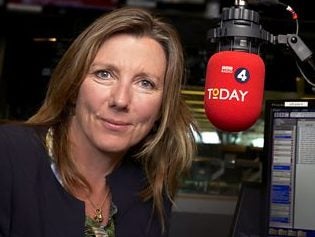
BBC Radio 4 presenter Sarah Montague has said she felt like a “sap” and was “incandescent with rage” after learning that she was paid less than her co-presenters on the Today programme.
Montague, who has now moved to present the World At One in a job swap with Martha Kearney, did not feature on the list of on-air talent paid more than £150,000 released by the BBC in July last year under Government edict.
She was paid £133,000 for her work on the show, while her co-presenters earned considerably more.
John Humphrys was paid up to £650,000 (making him the second highest-paid BBC journalist), Nick Robinson up to £300,000, Mishal Hussain up to £250,000 and Justin Webb up to £200,000.
Writing in the Sunday Times, Montague said that including her work on Hardtalk and other radio programmes she still was not paid more than £150,000.
She said: “I had long suspected that I was paid much less than my colleagues but until the pay disclosures I had no idea of the scale of that difference. Some years ago I was even assured by a manager that I was not the lowest paid on the programme.
“It is hard to communicate the range of emotions you feel on learning that you are paid so much less than people doing the same job as you.
“Pay is personal. It is a judgment of what you do every day and in my case had done for the previous two decades. It is the most powerful measure of what your employer thinks of you relative to your peers.
“Before the list was published I had thought there might be some moral high ground from taking less of the licence fee than others. What a fool I was. I felt nothing of the sort. Instead I felt a sap. For years I had been subsidising other people’s lifestyles.
“I also hadn’t clocked just how professionally damaging it would feel. When you are paid less it’s hard not to question your own ability and value to your employer.”
She added: “I felt incandescent with rage. Managers, who over the years had become friends, had known these figures and thought them acceptable.”
She implied that her salary was changed after the revelations last summer, but says that because she was told to set up a company when she joined the BBC more than 20 years ago, going freelance rather than joining staff, she hasn’t taken any workplace benefits or accrued a pension.
“Because of that, the pay gap will last my lifetime,” she said.
In the nine months since the BBC’s pay gap was revealed, Montague said her pay situation had yet to be fully resolved, but said moving to World at One meant she had a “deal for the future”. She also said she used the pay of previous World at One presenters “as a guide” in salary negotiations.
Motague, who is a member of the BBC Women group consisting of more than 150 producers and presenters, said the present situation had arisen because companies hadn’t been “open about pay”.
She added: “What’s needed is some light, perhaps even total transparency. That may be the fastest route for organisations such as the BBC to restore trust among staff and ensure the accountability of those setting pay.”
The BBC’s mean gender pay gap of 10.7 per cent is among the lowest across the UK news industry, it has subsequently been shown. The worst performer by this measure is magazine publisher Conde Nast.
Picture: BBC
Email pged@pressgazette.co.uk to point out mistakes, provide story tips or send in a letter for publication on our "Letters Page" blog
